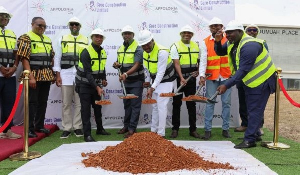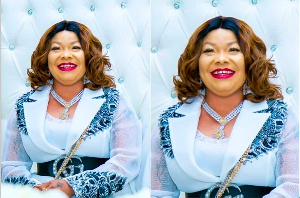Business News of Sunday, 29 September 2019
Source: classfmonline.com
Power cross-subsidisation prices challenge in Africa – GRIDCo CEO
The CEO of the Ghana Grid Company Limited (GRIDCo), Mr Jonathan Amoako-Baah, has noted that cross-subsidisation of electricity in Africa is a major challenge.
He said this while speaking at the opening ceremony of the 2019 AFRICON hosted by the Institute of Electrical and Electronics Engineers (IEEE), the world’s largest professional association dedicated to advancing engineering and technology for the benefit of humanity, on Wednesday, 25 September 2019 at the Ghana Institute of Management and Public Administration (GIMPA).
The Ghana section of IEEE is hosting this year’s 3-day conference on the theme: Powering Africa’s Sustainable Energy for All Agenda: The Role of ICT and Engineering.
“Ghana, like many developing countries, has a major problem which is the cross-subsidisation of electricity prices, to address the broader economic, political and social conditions of the country,” he said.
Also speaking at the same event, the Managing Director of the Electricity Company of Ghana (ECG), Mr Samuel Boakye-Appiah, said private investors have an important role to play in the energy sector in Africa and around the world in order to help the government to constantly supply power for domestic and commercial use.
He said: “Over the past 50 years, ECG has provided quality, safe and reliable electricity distribution services to support the economic growth and development of Ghana. Currently, with over 85% electricity access rate in Ghana, ECG and her sister utilities Volta River Authority, GRIDCo and NEDCo can be proud of our collective achievements. Unfortunately, the same cannot be said of the electricity penetration rate in sub-Saharan Africa”.
“According to a recent Africa Energy Outlook report published by International Energy Agency, ‘More than 620 million people live without access to electricity in Africa and those who do have access to modern energy face very high prices for a supply that is both insufficient and unreliable’.
“The same report adds that, ‘Overall, the energy sector of sub-Saharan Africa is not yet able to meet the needs and aspirations of its citizens’.”
Mr Boakye-Appiah added: “Africa is rising, yes, but Africa can only rise higher and faster on the back of sustainable energy as succinctly and eloquently captured by the theme for this conference. For sustainability in the energy sector to be sustainable, it must satisfy the following components; political acceptability, economic development, social equity and environment protection and affordability.
“Ensuring sustainability in the energy value chain requires huge capital investments to drive scientific research and technological innovations. With most African governments confronted with competing demands, infrastructure projects and social intervention programmes, they are constrained. Therefore, the onus of providing the needed capital investments for the development of sustainable energy resources to power Africa’s development is in the hands of the private sector”, he noted.












